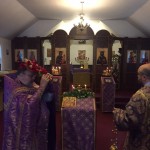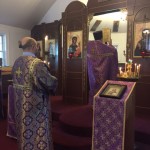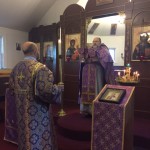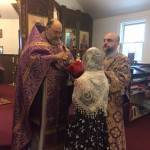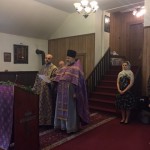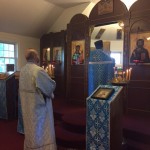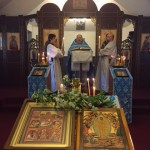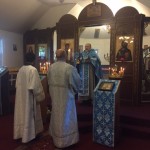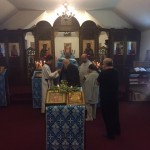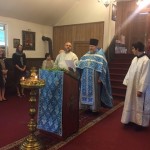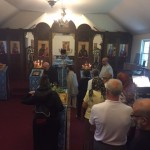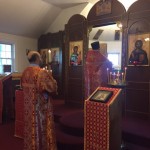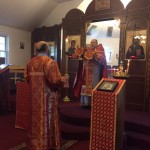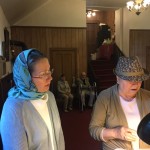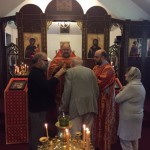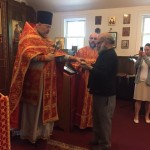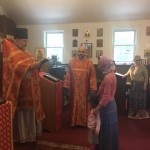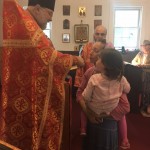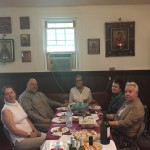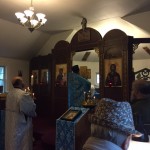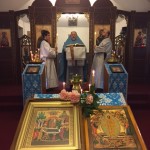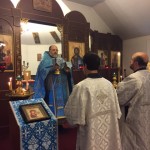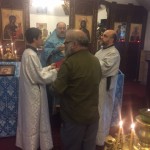On September 27th, on the feast of the Exaltation of the Precious and Life-giving Cross, we had a solemn celebration in our temple. Before the Hours Rector of St. George Church, Archpriest Igor Tarasov placed the cross in the middle of the church and venerated it.
At the Divine Liturgy, after the Gospel lesson the Rector preached a homily in Russian. An English translation of that homily is as follows:
“Dear brothers and sisters in Christ! Today we celebrate feast of the Exaltation of the Holy Cross. It is a Lord’s holy day but it is not dedicated to some event in the life of Christ, but to the Precious and Life-giving Cross. But the Cross of Christ cannot be separated from the crucifixion. Therefore, in today’s Gospel lesson we hear the sorrowful story of the holy Passions of the Lord, the story of His crucifixion. And today’s Epistle lesson proclaims that “we preach Christ crucified, to the Jews a stumbling block and to the Greeks foolishness” (1 Cor. 1, 23).”
“To the ancient Graeco-Roman world, the Christian claim of the cross was complete foolishness. If you are familiar with Greek mythology, you remember that Greek gods could also take on human appearance. For instance, Zeus did it to chase after women, causing more harm than help. We, Christians, believe that God assumed a human body and soul, not to find pleasure but to enter into our pain. This is the mystery and the glory of the Holy Cross.”
“The sign of the cross is often reduced to a good-luck charm. We wear it around our necks or we may make a sign of the cross when we begin something important. But let us remember that the Cross of Jesus Christ does not promise us success, health, or pleasure. The Cross only promises us that Jesus will be with us, no matter how badly we suffer, no matter how badly we fail, and no matter how horribly we feel. Jesus said, “Lo, I am with you always, even to the end of the age.” (Mt. 28, 20). It is through His Cross that Jesus is with us. That is the meaning of the Cross and that is the meaning of our Christian faith.”
“God enters into the depth, the pit of human experience through Jesus’ crucifixion and death. We are not alone. We wish that the Holy Cross meant that we don’t have to suffer, but it means that God chose to suffer with us. God’s ways are not our ways. The lesson of the Holy Cross is still very hard for us. That is why the Holy Cross became the sign of the Christian faith. Every Orthodox church is adorned by the cross, and the cross is everywhere among the Christian people. It is an emblem of our faith, the most known symbol of Christianity.”
“The Holy Cross is also a sign of hope. When we look on the Holy Cross, we can believe that there is hope beyond our suffering, our failures, and our loss. We can believe that there is hope for the suffering and heavy-burdened. There is hope because God will not abandon us in our sufferings.”
“And finally, the Holy Cross is a sign of love. God sent His Onlybegotten Son because He loved the world. Our Lord Jesus Christ suffered and died on the cross because He so loved the world. And the Cross is stretching its sides as the Lord Jesus stretched His arms on the Cross to embrace us in His infinite love.”
“Therefore, dear brothers and sisters, we must always exalt and lift up the Cross of Jesus Christ. We must exalt and honor that sign of our faith, the sign of our hope and the sign of God’s love. If the Greek gods played their games with humans, the God of Jesus Christ suffered with human kind. And He suffers with us. Exalting the Precious and Life-giving Cross we should realize that God is indeed with us.”
Our Cantor, Olga Roussanow beautifully performed hymns dedicated to the Holy Cross during preparation for Holy Communion.
Following the dismissal of the Liturgy the Rector and altar server performed the rite of Glorification before the Cross and the icon of the feast singing the troparion, kontakion and magnification of the Exaltation. After that the Rector and parishioners venerated the Cross.

